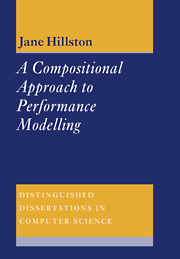Book contents
6 - Isomorphism and Weak Isomorphism
Published online by Cambridge University Press: 24 November 2009
Summary
Introduction
In this chapter we develop a very strong notion of equivalence between PEPA components called isomorphism. This is a condition on the derivation graphs of components and it ensures that components are only considered equivalent if there is a one-to-one correspondence between their derivatives and they are capable of carrying out exactly the same activities. It is not an observation based notion of equivalence in the style of bisimulation which is usual for process algebras. It is structural, in the style of the equivalence between Markov processes introduced in Section 5.3. Isomorphism is defined in Section 6.2.
In Sections 6.3 to 6.5 we examine some properties of this notion of equivalence, from the perspectives of a process algebra, the modelled system components and the underlying Markov processes. As we might expect from such a strong notion of equivalence, we can derive strong properties for isomorphism. The relation is a congruence for PEPA. The relationship between isomorphism and the Markov processes underlying the PEPA components is found to be a close one—isomorphic components generate equivalent Markov processes.
In the remainder of the chapter we develop a weaker form of this equivalence called weak isomorphism. This equivalence reflects the hidden nature of τ type activities. We will consider two components equivalent in this way if they only differ in their capabilities to carry out such activities. A definition of this notion of equivalence is presented in Section 6.6.
- Type
- Chapter
- Information
- A Compositional Approach to Performance Modelling , pp. 75 - 96Publisher: Cambridge University PressPrint publication year: 1996

